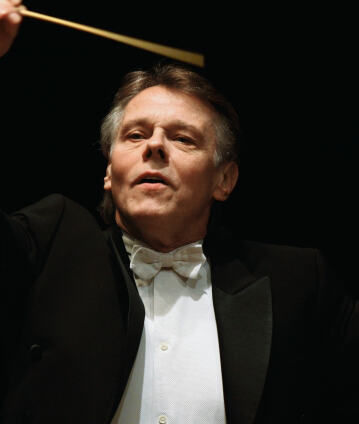Mariss Jansons and Truls Mørk

Dmitri Shostakovich reflects unsparingly on the horrors of the Stalin era with his Tenth Symphony. Specifically, the manic brutal second movement was conceived as a portrait of the dictator. The work is conducted at this concert by Mariss Jansons, whose musical origins were in the renowned Leningrad Shostakovich tradition; he was considered one of the best Shostakovich interpreters. We encounter soloist Truls Mørk in Henri Dutilleux’s yearning cello concerto.
“The Tenth Symphony made an incredibly great impression on me, even when I was just a small boy in Riga. I always loved Shostakovich. My inner world is closely linked with his,” Mariss Jansons admitted in an interview. From childhood on, the music of the Russian composer has been familiar to him – not least due to the collaboration of his father, conductor Arvīds Jansons, with Yevgeny Mravinsky, principal conductor of the Leningrad Philharmonic and later Mariss Jansons’s teacher, who premiered many of Shostakovich’s works.
From the beginning of his career, the native Latvian has espoused the Russian composer; he was considered the leading Shostakovich interpreter. Also as guest conductor of the Berliner Philharmoniker he frequently devoted himself to his works, though he has not conducted his Tenth Symphony here before. It is the first symphony with which Shostakovich went public after his ideological ostracism in the year 1948, ending only after Stalin’s death in 1953. The work generated heated contention after the premiere: the sombre mood of the first three movements and the seemingly artificial cheerfulness of the Finale were vexing.
The first part of this concert programme opens with Hector Berlioz’s brilliant overture Le Carnaval romain, which leads us into completely different musical worlds. Based on themes from his failed opera Benvenuto Cellini, the overture quickly became one of the French composer’s most successful pieces. The second work on the programme was inspired by verses from the cycle Les Fleurs du mal by Charles Baudelaire: Henri Dutilleux composed his expressive cello concerto entitled Tout un monde lointain for the Russian cellist Mstislav Rostropovitch.
© 2016 Berlin Phil Media GmbH
Related interviews
Artists
Our recommendations
- 2007 Europakonzert from Berlin with Simon Rattle, Lisa Batiashvili and Truls Mørk
- Mariss Jansons conducts Sibelius, Weber and Bartók
- 2001 Europakonzert from Istanbul with Mariss Jansons and Emmanuel Pahud
- Mariss Jansons and Frank Peter Zimmermann
- Mariss Jansons conducts Verdi’s Requiem
- Concert with Mariss Jansons and Hilary Hahn from Suntory Hall